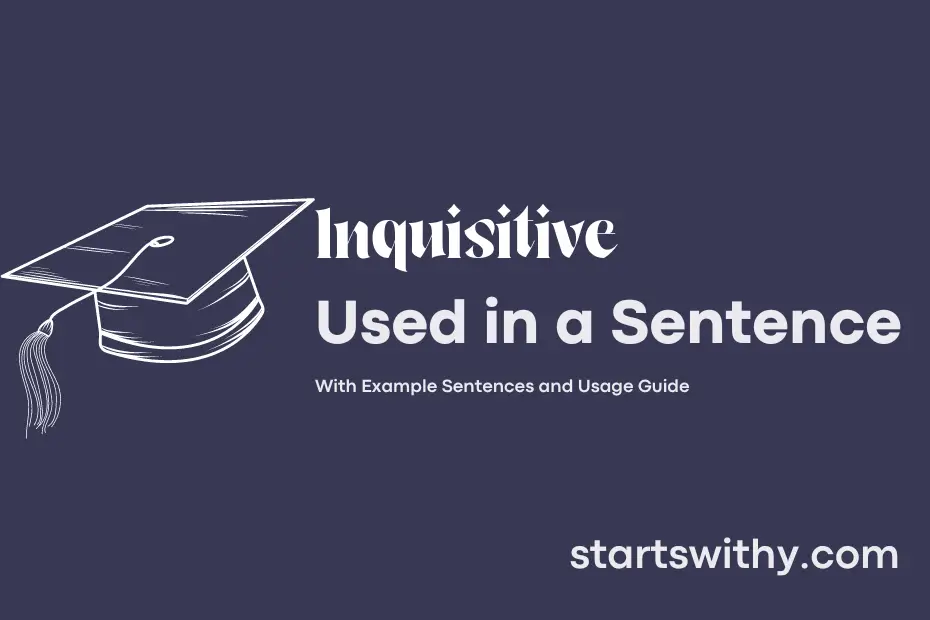Have you ever wondered what it means to be truly inquisitive? Inquisitive is an adjective that describes someone who is curious, eager to learn, and constantly seeking knowledge or information. An inquisitive person is always asking questions, exploring new ideas, and delving deeper into subjects that pique their interest.
Being inquisitive enables individuals to uncover new insights, gain a better understanding of the world around them, and expand their knowledge base. Inquisitive people are often seen as resourceful and open-minded, as they are willing to challenge their assumptions and explore different perspectives.
7 Examples Of Inquisitive Used In a Sentence For Kids
- Inquisitive children ask lots of questions every day.
- Be inquisitive and explore the world around you.
- Let’s be inquisitive and learn something new today.
- Inquisitive minds are always eager to learn more.
- It’s great to be inquisitive about how things work.
- Stay inquisitive and keep discovering new things.
- Being inquisitive helps us understand the world better.
14 Sentences with Inquisitive Examples
- Inquisitive students in India often excel in their academic pursuits by asking thought-provoking questions.
- Professors appreciate the inquisitive nature of college students as it shows a genuine interest in learning.
- The library is always filled with inquisitive students looking for resources to enhance their knowledge.
- College debates are the perfect platform for inquisitive students to explore different viewpoints and expand their perspectives.
- Being inquisitive is key to conducting thorough research and producing high-quality assignments.
- Group study sessions are more engaging when everyone is inquisitive and willing to share their knowledge.
- Extracurricular activities provide opportunities for inquisitive students to explore new interests outside of the classroom.
- Inquisitive students often seek out internships and work experience to gain practical knowledge in their field of study.
- Joining student clubs and organizations can satisfy the inquisitive nature of college students by offering different learning experiences.
- Inquisitive students are more likely to attend guest lectures and workshops to deepen their understanding of various topics.
- The curiosity of inquisitive college students drives them to seek out networking opportunities and connect with professionals in their industry.
- Field trips and educational tours are eagerly anticipated by inquisitive students who enjoy hands-on learning experiences.
- Inquisitive students often participate in hackathons and coding competitions to challenge themselves and enhance their skills.
- Taking electives outside of their major allows inquisitive students to explore diverse subjects and broaden their academic horizons.
How To Use Inquisitive in Sentences?
Inquisitive is used to describe someone who is curious and eager to learn or understand more about something. When using inquisitive in a sentence, it is important to ensure that the context fits the definition of the word.
Here is a simple guide on how to use inquisitive in a sentence:
-
Identify the context: Think about a situation where someone is showing curiosity or eagerness to learn more.
-
Choose the right subject: Select a person or a situation that demonstrates an inquisitive nature.
-
Formulate the sentence: Construct a sentence that clearly conveys the curious or eager nature of the subject.
-
Example sentence: “The young girl was inquisitive about the stars and asked her teacher many questions about space.”
-
Understand the meaning: Ensure that the sentence accurately depicts someone who is curious, eager to learn, or seeking understanding.
-
Practice makes perfect: Try using inquisitive in different sentences to become more comfortable with incorporating it into your vocabulary.
Remember, using inquisitive in a sentence can help you paint a vivid picture of someone’s curiosity or eagerness to learn. By following this guide, you can effectively incorporate this word into your everyday writing.
Conclusion
Inquisitive sentences serve to seek information, clarity, or understanding on a particular topic. Whether they begin with “What,” “How,” “Why,” or other interrogative words, these sentences aim to stimulate curiosity and engage the reader or listener in thought-provoking conversations. By posing questions and prompting reflection, inquisitive sentences pave the way for exploration, discovery, and deeper insights.
Utilizing inquisitive sentences effectively can enhance communication, encourage critical thinking, and facilitate meaningful discussions. When crafted thoughtfully, these sentences can propel learning, spark creativity, and foster impactful interactions. Embracing the power of inquisitive sentences can lead to more engaging writing, richer dialogue, and a more profound connection with others.



